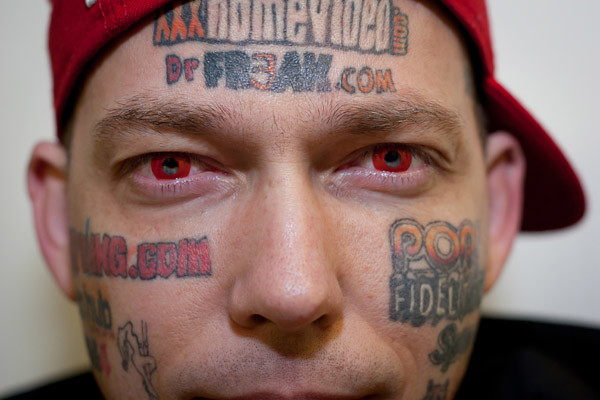
Getting a tattoo can be a symbolic personal decision, one that is not for everyone. It’s a decision to express something about their personality in a permanent and often publicly visible way. But what if your tattoo was meant to advertise for someone else instead of to display your own personality? Many individuals who value tattoos as a form of expression would be reluctant to engage in such “skinvertising” or the use of space on their body for tattoo advertisements. For a man famously known by the name Hostgator Dotcom, this would become a primary way to make money. Dotcom sold his body as advertising space for companies willing to pay him for it. Dotcom’s story brings up questions of where to draw the line between selflessness and self-respect. It also raises questions about the moral obligations of companies when making advertising choices that permanently or seriously affect those doing the advertising.
Before he became Hostgator Dotcom, he was Billy Gibby. He was someone who “had a passion for helping people in need,” but many said he “took helping people in need to an extreme” (Gibby, 2009). Dotcom donated his kidney to a stranger he became acquainted with over Yahoo Messenger; this action motivated him to get his first sponsored tattoo. Dotcom got the idea from a boxer named Bernard Hopkins. Dotcom thought “if Bernard can get them to advertise on him with a temporary tattoo advertisement maybe they would advertise on me as well” (Gibby, 2009). The difference between Hopkin’s and Dotcom’s tattoos? Dotcom’s tattoo was permanent. Dotcom used the money from the tattoo to recover from surgery. He would continue to get more tattoos from other companies to support his boxing career, but when the recession hit in the late 2000s, Dotcom reluctantly decided to sell advertising space on his face. Dotcom says that he didn’t want his kids “to be homeless and live on the street” (Conti, 2015). To support his family, Dotcom “sold off the rights to his original name to the highest bidder, which happened to be Hostgator.com” (Spooky, 2012).
Many of the companies that advertised through tattoos on Dotcom’s face were porn websites. The advertisements’ explicit nature took Dotcom off the bill for an upcoming boxing match and even prevented him from getting jobs. Dotcom said the tattoos were “affecting how people perceive [him] as a person when in the first place [he] was only having these tattoos to benefit others” (LADbible, 2018). Because of these financial struggles, Dotcom’s only choice was to get rid of the facial tattoos by selling more advertising space on his body while attempting to get a job. Dotcom’s mental health took a decline during this time. He said that “it got to the point where I was really depressed, almost suicidal . . . I got kind of scared, so I went to get help at the local behavioral health center, and they diagnosed me with bipolar” (Conti, 2017). Fortunately, Dotcom was able to crowdfund money for his tattoo removal efforts and officially reclaimed his face in 2017. Though he still has plans to remove the remaining tattoos throughout his body, he’s landed a respectable career as a case manager at a behavioral health center.
Many argue that Dotcom’s actions were selfless because “in selling his face and his name, he’s sold perhaps the two most defining traits of one’s sense of self” (Stuef, 2012). He sold his own identity, subsequently sacrificing his mental health, as a means to keep his family off the streets. His name became the internet equivalent of a street address. Dotcom defends his actions by saying that each time he got a tattoo on his body he knew that would keep them off the streets for that month, but he knew that he would need to get more (LADbible, 2018). Others argue that Dotcom’s continued engagement with tattoo advertisements only enabled self-destruction. He says that he got “so depressed that [he] looked in the mirror and cried about what [he had] become” (LADbible, 2018). For Dotcom, One could say that he has suffered “a facial trauma of a sort–albeit a self-inflicted trauma spread out over the years” (Conti, 2015). Facial trauma and scarring are associated with significant negative psychological and social effects (Levine, 2005). Despite Dotcom’s intentions of supporting his family, his seemingly inconsequential decision to get sponsored tattoos slowly built up over time and spread across his entire body, leading some to suggest that he lost his sense of self in his selfless actions.
Some question the decisions made by the companies that advertised on Dotcom. While they provided a means for Dotcom to sustain his family, critics question whether the companies’ actions were dehumanizing, arguing that they simply made these humans “walking billboards for their brands” (Stuef, 2012). They argue that this is a commentary on the further dwindling options for the working class to make money to sustain themselves. The working class “sees their options dissipating, and [websites] and the tech industry at large […] have little use for the less educated” (Stuef, 2012). Dotcom confesses that he regrets getting the tattoos on his face since he “only did them because of mental illness” (Moye, 2013). This brings up concerns that companies may have been taking advantage of Dotcom’s mental illness to make money. While they provided doses of income, the tattoo advertisements placed Dotcom in a position where he struggled to get a long-term job because “people didn’t want to hire a man with porn website tattoos on [his] face” (LADbible, 2018). This led to a cycle where Dotcom felt the need to continue selling his skin for advertising space to make money.
When it comes to advertising using people’s bodies, is everything free game? Or are there lines that shouldn’t be crossed? Do companies have a role to play when it comes to paying people to advertise their company? Or was this an example of companies taking advantage of someone who didn’t have any other viable options?
Discussion Questions:
- What values are in conflict with Dotcom’s decision to sell space on his body for income?
- Do the type of tattoos factor into your judgment about the ethics of selling tattoo space? What would you say if the tattoos were for charity organizations?
- Does informed consent from the person getting tattooed matter? Assuming Dotcom made a clear and informed decision to get more tattoos without the concern of mental illness, would there still be ethical worries about this path of fundraising? Does one have ethical obligations concerning what they do to and with their body?
- What responsibilities, if any, do companies have when it comes to tattoo advertisements? What sort of principles ought to guide companies interested in skinvertising on others?
Further Information:
Conti, A. (2015, May 12). Hostgator M. Dotcom’s Struggle to Regain His Face After Selling It to Internet Companies. https://www.vice.com/en/article/avyd8a/the-sad-saga-of-hostgator-m-dotcom-812#
Conti, A. (2017, June 19). Hostgator M. Dotcom Is Finally Free from His Porn Face Tats. https://www.vice.com/en/article/qv4ndq/hostgator-m-dotcom-is-finally-free-from-his-porn-face-tats
Gibby, B. (2009, August 2). Tattoo Blog » My Adventures In Tattoo Advertising. http://www.tattooblog.com/2009/08/my-adventures-in-tattoo-advertising/
Levine, E., Degutis, L., Pruzinsky, T., Shin, J., & Persing, J. A. (2005). Quality of life and facial trauma: Psychological and body image effects. Annals of Plastic Surgery, 54(5), 502–510. https://doi.org/10.1097/01.sap.0000155282.48465.94
Man Who Turned Himself Into “Human Billboard” Is Now Crowd-Funding To Get Tattoos Removed. (2018, February 7). LADbible. https://www.ladbible.com/community/viral-interesting-the-human-billboard-is-now-crowd-funding-to-get-his-tattoos-removed-20180207
Moye, D. (2013, March 19). Billy Gibby, AKA “Hostgator Dotcom”, Wants To Finance Removal Of 20 Facial Tattoos With More Tattoos. HuffPost. https://www.huffpost.com/entry/billy-gibby-aka-hostgator_n_2902509
Spooky. (2012, September 19). Meet Hostgator Dotcom, Formerly Known as Billy Gibby, the Human Billboard. Odditycentral. https://www.odditycentral.com/pics/meet-hostgator-dotcom-formerly-known-as-billy-gibby-the-human-billboard.html
Stuef, J. (2012, September 17). Branded For Life. BuzzFeed News. https://www.buzzfeednews.com/article/jackstuef/branded-for-life
Authors:
Trent A. Probeck, Leah A. Ransom, & Scott R. Stroud, Ph.D.
Media Ethics Initiative
Center for Media Engagement
University of Texas at Austin
April 18, 2024
Image: Hostgator Dotcom / Flickr
Cases produced by the Media Ethics Initiative are for educational use only and remain the intellectual property of the Media Ethics Initiative and the Center for Media Engagement. This case was supported by funding from the John S. and James L. Knight Foundation. This case can be used in unmodified PDF form in classroom or educational settings. For use in publications such as textbooks, readers, and other works, please contact the Center for Media Engagement.
Ethics Case Study © 2024 by Center for Media Engagement is licensed under CC BY-NC-SA 4.0




